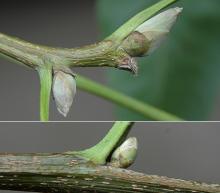Carya laciniosa
Common name:
Shellbark Hickory
Pronunciation:
KA-ri-a la-sin-i-O-sa
Family:
Juglandaceae
Genus:
Type:
Broadleaf
Native to (or naturalized in) Oregon:
No
- Broadleaf deciduous, high branching tree, 60-80 ft (18-24 m) tall, or more, straight slender trunk with shaggy bark. Leaves alternate, pinnately compound (odd-pinnate), usually 7 leaflet, occasionally 5 or 9, oblong-lanceolate, 10-20 cm long, acuminate, margin serrate and hairy but not in tufts, dark yellow green and pubescent below. Flowers are monoecious, male (staminate) and female (pistillate) flowers on the same tree; males flowers are 5-8(20) cm long, yellow-green catkins; females flowers are short, in clusters at the end of the branches, appearing in mid-spring. Fruit ellipsoid or subglobose, 4-7 cm long, splitting along 4 lines when ripe, husk 6-12 mm thick; the enclosed nut is 4 angled, thick-shelled, hard, kernel sweet, edible.
- Sun
- Hardy to USDA Zone 5 Native range from New York to southern Ontario and Iowa, south to Tennessee and Oklahoma; occurs in moist to wet sites.
- laciniosa: slashed or torn into narrow divisions, apparently a reference to the plates of its shaggy bark.
- Oregon State Univ. campus: east of Dixon Lodge, next (north side) to the sidewalk along Jefferson Ave.










